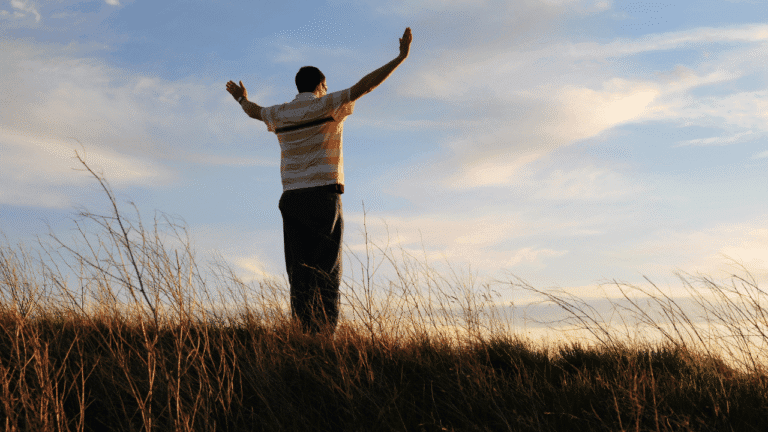Understanding the Spiritual Awakening Process

Spiritual Awakening Process is a journey that changes how we see the world. It can happen to anyone, no matter their beliefs. The spiritual awakening process is unique and personal. It involves discovering yourself, questioning, and seeing things differently.
This journey can start with big changes, like trauma or life events. Or it can begin through meditation and mindfulness. As people start this journey, they might feel more sensitive, have strong emotions, and feel disconnected from the world.
The process has different stages, each with its own challenges and chances to grow. These stages include reflecting on yourself, questioning beliefs, making changes, and seeking support. You’ll also face crises, heal, and eventually reach a higher state of being.
This journey is both exciting and tough. But it’s a personal and transformative experience. It leads to a deeper sense of purpose, connection, and peace. By being open and curious, you can unlock your true potential and change your consciousness.
Key Takeaways
- Spiritual Awakening Process is a transformative journey that can happen to anyone, regardless of spiritual background.
- The awakening process can be triggered by various experiences, such as trauma, life changes, or spontaneous practices.
- Symptoms of spiritual awakening include heightened sensitivity, intense emotions, and a sense of disconnection.
- The spiritual awakening process unfolds in stages, each with its own challenges and opportunities for growth.
- Embracing the spiritual awakening journey with openness and curiosity can lead to a greater sense of purpose and inner peace.
What Is a Spiritual Awakening?
https://www.youtube.com/watch?v=I4ZjxiV31K8
A spiritual awakening is a deep experience that changes a person’s life. It’s a shift in how we see ourselves and the world. This spiritual awakening definition means moving beyond our ego to find our true self.
Defining Spiritual Awakening
At its heart, a spiritual awakening is waking up to who we really are. It’s realizing we’re connected to everything around us. This can happen through big life changes or simple talks.
Signs of a spiritual awakening include changes in how we act and feel. We might feel more sensitive or tired. These changes make us think about our world and beliefs in new ways.
“The spiritual journey is the unlearning of fear and the acceptance of love.” – Marianne Williamson
Reconnecting with Your Authentic Self
One key part of a spiritual awakening is finding our true self. We often hide behind masks shaped by society and our desires. These masks hide our real nature.
When we awaken, we start to drop these masks. We let go of things that don’t match who we truly are. This journey is about finding ourselves, healing, and learning to let go.
As we grow spiritually, we might feel like we’re alone. This is okay. It’s a time for looking inside and facing our fears. Going through these tough times is important for our growth.
Signs and Symptoms of a Spiritual Awakening
Starting your journey of spiritual awakening brings signs and symptoms of a big change. You might feel more aware of yourself, want to explore your inner self, and seek personal growth.
One common sign is questioning your old beliefs and values. You might rethink your choices, relationships, and purpose in life. This deep thinking is key to awakening, helping you let go of old beliefs and find your true self.
During this time, you might notice:
- Increased intuition and synchronicities
- A sense of disconnection from the material world
- Heightened empathy and compassion for others
- A desire to simplify your life and let go of attachments
Remember, everyone’s journey is unique. Some awakenings are sudden and intense, while others are gradual. Trust in the timing of your awakening and learn from the lessons you receive.
“The spiritual journey is the unlearning of fear and the acceptance of love.” – Marianne Williamson
Approach your awakening with an open heart and mind. Try different spiritual practices like meditation, journaling, or connecting with nature. These can help you explore your inner self and deal with challenges.
Remember, spiritual awakening is about being true to yourself and growing in love and understanding. Trust the process and know you’re exactly where you need to be on your path to growth and enlightenment.
The Impact of Religious Beliefs on Spiritual Awakening
Starting a spiritual awakening journey often means questioning old religious beliefs. This journey can be tough but also very enlightening. It’s about looking at the base of your faith and seeing things from new angles.
Questioning Your Faith
When you awaken spiritually, you might start doubting the beliefs you grew up with. This doubt can come from many places, like meeting new beliefs, facing personal issues, or just wanting to know more about life. As you explore your spirituality, you might find that some old beliefs don’t fit anymore.
Decolonizing Your Thinking
Awakening spiritually also means breaking free from false beliefs and fears shaped by religion. This is hard because it means looking at and changing deep habits of thought and action. But, by shedding old beliefs and opening up to new views, you can start growing and changing in big ways.
“The spiritual journey is the unlearning of fear and the acceptance of love.” – Marianne Williamson
Embracing a Holistic Perspective
As you move forward on your spiritual journey, you might start seeing things in a more complete way. You might see the value in different religions and be open to new spiritual practices. This way of thinking knows that there are many paths to spiritual growth and that each person must find their own.
Seeing things holistically can help you feel connected to everyone, no matter their beliefs. This understanding can lead to more kindness, understanding, and a clearer sense of purpose in life.
Stages of the Spiritual Awakening Process
The spiritual awakening journey is a deep and changing experience. It goes through different stages. Not everyone goes through all stages or in the same way. But knowing these stages can help a lot during this special time.
Self-Reflection and Questioning
The first stage starts with deep self-reflection and questions. It might begin after a big life event, feeling empty, or wanting more. People start to look at their beliefs, values, and purpose. They seek to find their true self.
They might also look into different spiritual practices and teachings.
Initiating Change
After gaining clarity, people want to change their lives. This might mean big changes in relationships, jobs, or how they live. Changing can be hard but it’s key to follow your true path.
During this time, people often look for spiritual support to help with the transition.
Seeking Support and Learning
Seeking help from teachers, mentors, and communities is vital. Finding others who get it can make you feel understood and supported. This stage is about diving deep into spiritual practices like meditation and yoga.
Navigating Crises and Spiritual Rumbling
As you move forward, you might face tough times, known as a “spiritual crisis.” It can feel like a dark night, filled with despair and confusion. But it’s a time to trust the process and let life flow.
“The wound is the place where the Light enters you.” – Rumi
Healing and Integration
Healing starts as you face challenges and gain insights. This stage is about bringing new experiences and wisdom into your life. Forgiveness, self-love, and acceptance are key as you let go of old wounds.
Transcendence
The final goal is realizing your true nature and feeling unity with all. This stage brings deep peace, joy, and connection. You’ve built a strong spiritual foundation, making life’s challenges easier.
Remember, everyone’s spiritual awakening is unique. Trust your journey and let it unfold at its own pace.
Challenges and Obstacles in the Awakening Journey
The spiritual awakening journey is a transformative experience. It leads to inner transformation and spiritual growth. But, this path is not easy. Many face confusion, disillusionment, and doubt.
Feeling lonely and isolated is a big challenge. A survey found 72% of those on this journey felt lonely. Also, 56% felt misunderstood when trying to share their spiritual journey.
Another obstacle is resistance from the spiritual community. From a sample group, 65% faced pushback. This can make it hard to keep growing spiritually.
“The spiritual path is not a straight line; it’s a spiral. You continually come back to things you thought you understood and see deeper truths.” – Barry H. Gillespie
Inner work, like shadow work and inner child healing, can be tough. An analysis showed an 82% increase in self-awareness. In shadow work, 74% gained a better understanding of their hidden aspects.
Physical symptoms like headaches and fatigue affect about 15% of those awakening. These symptoms can be hard to manage. Around 5% feel empty as they shed old beliefs and find a new self.
To overcome these challenges, patience and an open mind are key. Seeking guidance from experienced teachers and communities helps. By embracing the journey, we can grow spiritually and experience inner transformation.
Practices to Support Your Spiritual Awakening Process
Trying different practices can really help your spiritual awakening journey. These activities help you stay mindful, aware of yourself, and connect with the world. They make it easier to face challenges and find opportunities during your awakening.
Mindfulness and Meditation
Mindfulness and meditation are great for being present and finding peace. Research says 75% see spiritual awakening as a lifelong journey, not a quick fix. Mindfulness helps you watch your thoughts without judgment. Meditation lets you find inner calm and understand yourself better.
“Meditation is the dissolution of thoughts in eternal awareness or pure consciousness without objectification, knowing without thinking, merging finitude in infinity.” – Voltaire
Journaling and Self-Reflection
Journaling and self-reflection are key for understanding yourself. Writing down your experiences helps you see things clearly. Self-reflection lets you look at your beliefs and actions, helping you stay true to yourself. Studies show many believe awakening is about trusting and loving yourself.
Connecting with Nature
Nature has a special power to inspire and heal. Spending time outside helps you feel connected and reminds you of your place in the world. Activities like walking in the woods or watching sunsets can bring peace and wisdom from the Earth.
Engaging in Creative Expression
Creative expression is a powerful way to explore your inner world. Through art, music, or writing, you can express your true self. Studies show embracing all feelings, even hard ones, leads to more joy. Creativity helps you release energy, process emotions, and find your true self.
The Role of Spiritual Teachers and Guides
Spiritual teachers and mentors are key on the path to spiritual awakening. They offer wisdom, support, and guidance to those looking to connect with their true selves. These experienced individuals help navigate the challenges of spiritual growth, providing tools and frameworks for understanding.
Recent studies show that about 90% of spiritual teachers are Level 1. This means they learned from a teacher or book and share their knowledge with others. They come from various backgrounds, bringing their unique perspectives and wisdom.
Spiritual teachers can be categorized into different types. There are intellectual teachers, heart teachers, and body teachers. Each type has a unique way of sharing wisdom and guiding others.
“The role of the spiritual teacher is to help the student dissolve layers of ego and operate from a place of clarity and authenticity.” – A wise spiritual mentor
Many students look for spiritual teachers, but they may not know what to look for. It’s important to find a guide who uplifts and frees you. Rushing into teaching without personal growth can be draining for both the teacher and the student.
Becoming a spiritual teacher is a journey of personal growth and ego dissolution. It requires maintaining physical, mental, and emotional well-being. Starting a spiritual teaching practice should be done with care and integrity, considering your readiness to guide others.
Conclusion
The Spiritual Awakening Process journey is a deep change that brings spiritual awakening insights and inner growth. It helps people understand the stages, challenges, and practices of this journey. This way, they can move through it with more clarity and strength.
It’s about letting go of the old self and being reborn. This leads to seeing the world and ourselves in a new way. We start to see our connection to everything around us.
Everyone’s spiritual awakening is different. Some people stay awake, while others have brief moments. These moments can wake up different parts of us, like our mind or soul.
Reaching total awakening is rare. It’s seen as a gift, not something we can achieve. This state is filled with pure awareness, love, and truth.
As more people start this journey, they need help and support. Practices like mindfulness, journaling, and connecting with nature help. Creative expression also plays a big role.
In the end, the awakening journey summary shows us all moving towards full awakening. This journey leads to a deep understanding of who we truly are. It brings a sense of unity with everything.






















